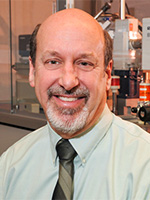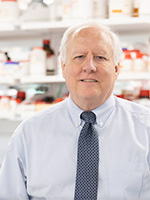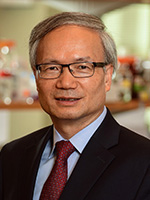Jeffrey L. Benovic, PhD
 Jeffrey L. Benovic, PhD is the Thomas Eakins Professor in the Department of Biochemistry and Molecular Biology at Thomas Jefferson University. He received his BS in biochemistry from the Pennsylvania State University and his PhD in biochemistry
and postdoctoral training at Duke University working with Nobel Laureate Robert Lefkowitz. Dr. Benovic moved to Temple University School of Medicine in 1989 and then to the Department of Pharmacology at Thomas Jefferson University in 1991.
Jeffrey L. Benovic, PhD is the Thomas Eakins Professor in the Department of Biochemistry and Molecular Biology at Thomas Jefferson University. He received his BS in biochemistry from the Pennsylvania State University and his PhD in biochemistry
and postdoctoral training at Duke University working with Nobel Laureate Robert Lefkowitz. Dr. Benovic moved to Temple University School of Medicine in 1989 and then to the Department of Pharmacology at Thomas Jefferson University in 1991.
The Benovic laboratory studies the mechanisms that regulate G protein-coupled receptor (GPCR) signaling with a focus on understanding how dysregulation of signaling contributes to the development of disease. These efforts began during his training at
Duke where he discovered, purified and cloned the beta-adrenergic receptor kinase (GRK2) and demonstrated how it functioned in collaboration with arrestins to desensitize GPCRs in a reconstituted biochemical system. His research group would go on
to clone additional members of the GRK and arrestin families and demonstrate in molecular detail how these components function to regulate receptor activity. His group also discovered that β-arrestins interact with clathrin to promote receptor
endocytosis, a core paradigm in GPCR biology, and dissected a role for ubiquitination in GPCR sorting and lysosomal degradation. Dr. Benovic has published over 320 manuscripts and reviews, and his work has been supported by the National Institutes
of Health for the past 35 years. Current efforts in the Benovic laboratory focus on the development of biased ligands and allosteric modulators to selectively regulate GPCR function.
Dr. Benovic has a strong commitment to mentorship and education and has trained over 50 predoctoral and postdoctoral fellows. He has held leadership positions in education including Director of the Molecular Pharmacology and Structural Biology PhD Program
in the Jefferson College of Life Sciences and Associate Director of Education in the Sidney Kimmel Cancer Center. He also served as Chair of the Department of Biochemistry and Molecular Biology in the Sidney Kimmel Medical College at Jefferson.
Dr. Benovic has been a member of ASPET since 1999 and has been actively involved in the society serving on the Molecular Pharmacology editorial board since 1998 and helping to organize several ASPET meetings. He received the Julius Axelrod award
from ASPET in 2014 and was named a Fellow of the American Society for Biochemistry and Molecular Biology in 2022.
Randy D. Blakely, PhD
 Dr. Randy Blakely, a native of Columbus, Georgia, graduated from Jordan Vocational High School as Valedictorian and as a National Merit Scholar. He pursued undergraduate studies at Emory University, receiving a BA summa cum laude in Philosophy,
with Minors in Physics and Chemistry. During this period, he worked in the laboratories of James Herndon at the Yerkes Primate Center, in the Department of Physics with Ray Duvarney, and in the Department of Chemistry with Joseph Justice, each effort
leading to peer-reviewed publications, including two as first author. Thereafter, he pursued a PhD in Neuroscience at the Johns Hopkins School of Medicine, working with Dr. Joseph T. Coyle on the neurobiology of brain peptides, followed by postdoctoral
training at the Yale/HHMI Center for Molecular Neuroscience, working with Dr. Susan G. Amara to elucidate mechanisms of neurotransmitter inactivation. Following an initial faculty appointment at Emory University (1990-1995), Blakely moved to the Vanderbilt
University School of Medicine, holding for the next 21 years the Allan D. Bass Endowed Chair in Pharmacology.
Dr. Randy Blakely, a native of Columbus, Georgia, graduated from Jordan Vocational High School as Valedictorian and as a National Merit Scholar. He pursued undergraduate studies at Emory University, receiving a BA summa cum laude in Philosophy,
with Minors in Physics and Chemistry. During this period, he worked in the laboratories of James Herndon at the Yerkes Primate Center, in the Department of Physics with Ray Duvarney, and in the Department of Chemistry with Joseph Justice, each effort
leading to peer-reviewed publications, including two as first author. Thereafter, he pursued a PhD in Neuroscience at the Johns Hopkins School of Medicine, working with Dr. Joseph T. Coyle on the neurobiology of brain peptides, followed by postdoctoral
training at the Yale/HHMI Center for Molecular Neuroscience, working with Dr. Susan G. Amara to elucidate mechanisms of neurotransmitter inactivation. Following an initial faculty appointment at Emory University (1990-1995), Blakely moved to the Vanderbilt
University School of Medicine, holding for the next 21 years the Allan D. Bass Endowed Chair in Pharmacology.
In 2016, he moved to Florida Atlantic University (FAU) as founding Executive Director of the FAU Stiles-Nicholson Brain Institute, holding the David J.S. Nicholson Professorship in Neuroscience. Blakely’s research led to the first cloning of genes
that encode the brain’s major targets for antidepressant medications as well as those targeted by addictive and therapeutic psychostimulants, including cocaine and amphetamine. Blakely’s work has uncovered human mutations in these genes,
work that has shed light on mechanisms related to brain and autonomic disorders. His expertise has led to service as a member of scientific advisory boards of multiple, major pharmaceutical companies and private foundations that sponsor research on
brain disorders. He has also served the National Institutes of Health as a member and chair of the National Institute of Mental Health (NIMH) Board of Scientific Counselors as well as service on the National Advisory Mental Health Council of
the NIMH, which advises the Institute’s Director on funding priorities. Having a broadly impactful research program, his work includes studies that target the structure and function of membrane proteins, protein phosphorylation and trafficking,
CNS and gut signaling in relation to autism, neural-immune crosstalk in relation to mood disorders, and brain disorders with cardiovascular and metabolic disorders, as well as neurodegenerative disease.
Across his career, Blakely has published more than 360 research papers that cumulatively have garnered more than 36,000 citations, with 1,000 or more citations to his work arising in each of the past 20 years. Dr. Blakely’s discoveries have resulted
in more than a dozen patents, leading to his induction into the U.S. National Academy of Inventors. Complementing his academic activities, he has collaborated with or served as an advisor for medication development companies including Pfizer,
Amgen, Wyeth, and Lundbeck. He is also an elected member of the American Association for the Advancement of Science and the American College of Neuropsychopharmacology. Dr. Blakely has received numerous awards for his research and mentorship, including
the Astellas Award and Julius Axelrod Prize from the American Society of Pharmacology and Experimental Therapeutics, two Distinguished Investigator Awards from the Brain and Behavioral Research Foundation, a Zenith Award from the Alzheimer’s
Association, and a MERIT Award from the NIH, from which he has been continually funded for more than 30 years.
Blakely has mentored dozens of trainees across his career, including more than 100 undergraduate researchers, 39 Masters and Doctoral students, and over 40 postdoctoral fellows, a sizeable number now holding senior academic and industry positions. As
a testament to his passion for using research as a vehicle to inspire youth toward careers in science, Blakely received the F. Peter Guengerich Award for Postdoctoral Mentoring, the Dolores C. Shockley Partnership Award, and a Lifetime Achievement
Award in STEM Education from the Cox Science Center. Through his more than three decades of participation on the Scientific Advisory Board of the Brain and Behavioral Research Foundation, he has helped identify promising young scientists and
propel their careers forward as well as recognize more senior scientists whose work has brought hope to those, likely Blakely’s own family, have been afflicted with major mental illnesses. He also serves on the Advisory Board of the Brain Foundation,
which sponsors research in autism and related disabilities, the Medical Committee of the Ryan Licht Sang Bipolar Foundation, and the Mind, Music and Movement for Neurological Disorders.
In 2022, Blakely was honored with the Neuroscience Educator Award from the Society for Neuroscience, the world’s largest society of neuroscience researchers. Currently, he directs the Neuroscience Graduate Program at Florida Atlantic University
where he continues to advance the careers of young neuroscientists, encouraging them to hone their skills at the bench and to give back to the communities who stare down serious brain disorders and yearn for a healthy life.
Arthur Christopoulos, PhD, FAA, FAHMS
 Arthur Christopoulos is the Professor of Analytical Pharmacology and the Dean of the Faculty of Pharmacy & Pharmaceutical Sciences, Monash University, Australia. Prior to his appointment as Dean in 2019, he was a Senior Principal Research Fellow
of the National Health and Medical Research Council of Australia. Professor Christopoulos trained as a pharmacist and subsequently obtained his PhD in pharmacology from the Victorian College of Pharmacy (Monash University) Melbourne. After a two-year
postdoctoral period at the University of Minnesota, he returned to Australia to establish his independent research program.
Arthur Christopoulos is the Professor of Analytical Pharmacology and the Dean of the Faculty of Pharmacy & Pharmaceutical Sciences, Monash University, Australia. Prior to his appointment as Dean in 2019, he was a Senior Principal Research Fellow
of the National Health and Medical Research Council of Australia. Professor Christopoulos trained as a pharmacist and subsequently obtained his PhD in pharmacology from the Victorian College of Pharmacy (Monash University) Melbourne. After a two-year
postdoctoral period at the University of Minnesota, he returned to Australia to establish his independent research program.
His research focuses on allosteric modulation and biased agonism at G protein-coupled receptors (GPCRs), the largest drug target class for modern medicines, and incorporates computational and mathematical modelling, structural and chemical biology, molecular
and cellular pharmacology, medicinal chemistry, and preclinical models of behavior and disease. His work has been applied to studies encompassing neurological and psychiatric disorders, cardiovascular disease, obesity, diabetes, chronic pain and addiction.
He has received substantial, long-term support from international and national competitive, charitable and commercial sources, as well as being academic co-founder of three recent spinouts/startup companies focusing on novel GPCR drug discovery, including
Septerna Inc., which was publicly listed on the NASDAQ in late October 2024.
Professor Christopoulos has over 370 publications, including in leading international journals such as Nature, Science and Cell, and has delivered over 180 invited presentations. To date, he was successfully supervised/mentored researchers at all career
stages, including 31 PhD and 23 Honours students, as well as 42 postdoctoral researchers. Many of his trainees have attained senior positions as independent research Fellows, tenured Faculty, or industry leaders (>60% women), and most remain active
leaders in the GPCR field.
Professor Christopoulos has served on the Editorial Board of 8 international journals (including Associate Editor of Molecular Pharmacology, JPET and Pharmacological Reviews) and was a Councillor of the International Union of
Basic and Clinical Pharmacology (IUPHAR). He has also been the recipient of multiple major awards, including the John J. Abel Award and the Goodman and Gilman Award from the American Society for Pharmacology and Experimental Therapeutics; the Rand
Medal and the ASCEPT Lectureship Award from the Australasian Society of Clinical and Experimental Pharmacologists and Toxicologists; the British Pharmacological Society’s Gaddum Memorial Award; the IUPHAR Sir James Black Analytical Pharmacology
Lecturer; the GSK Award for Research Excellence and a Doctor of Laws (Honoris Causa) from the University of Athens. Since 2014, Clarivate Analytics have annually named him a Highly Cited Researcher in ‘Pharmacology & Toxicology’, and
in 2022 also named him a Highly Cited Researcher in the additional category of ‘Biology & Biochemistry’. In 2017, he was elected a Fellow of the Australian Academy of Health and Medical Sciences, in 2018 as a Fellow of the British
Pharmacological Society, and in 2021 he was elected a Fellow of the Australian Academy of Science for his seminal contributions to drug discovery. In 2023, he was elected a Fellow of the Pharmaceutical Society of Australia.
Susan P.C. Cole, PhD, FRSC, FCAHS
 Susan Cole is the Allie Vibert “Vi” Douglas Distinguished University Professor Emerita and Adjunct Professor (active) in the Department of Pathology & Molecular Medicine at Queen’s University in Kingston, Canada. She obtained
her BSc (Biochemistry) and PhD (Pharmacology, 1981) at Queen’s where her PhD thesis focused on the biochemical mechanisms underlying the drug-induced porphyrias. Dr. Cole undertook post-doctoral training at the NIH with Dr. Harry Gelboin. Here
she participated in the early cloning of the CYPP450s and developing P450 isoform-selective monoclonal antibodies. Dr. Cole then returned to Queen’s under the mentorship of Dr. John C. Roder which stimulated her interest in lung cancer and drug
resistance. She was appointed Assistant Professor (1983) and a Cancer Care Ontario Scientist (1985-2008). Dr. Cole was promoted to full professor (with tenure) (1995) in the Sinclair Cancer Research Institute at Queen’s. Dr. Cole held a prestigious
Tier 1 Canada Research Chair (2001-2015), was the inaugural recipient of the Bracken Chair in Genetics & Molecular Medicine (2006-2021) and was among the first appointed Distinguished University Professors (2019). Dr. Cole has served at the highest
levels of the University, first on its Board of Trustees and as a member of Senate, and then as Queen’s inaugural Deputy Provost (2010-2012). She also served on the Board of Directors of PARTEQ, the University’s technology transfer unit
(1999-2006).
Susan Cole is the Allie Vibert “Vi” Douglas Distinguished University Professor Emerita and Adjunct Professor (active) in the Department of Pathology & Molecular Medicine at Queen’s University in Kingston, Canada. She obtained
her BSc (Biochemistry) and PhD (Pharmacology, 1981) at Queen’s where her PhD thesis focused on the biochemical mechanisms underlying the drug-induced porphyrias. Dr. Cole undertook post-doctoral training at the NIH with Dr. Harry Gelboin. Here
she participated in the early cloning of the CYPP450s and developing P450 isoform-selective monoclonal antibodies. Dr. Cole then returned to Queen’s under the mentorship of Dr. John C. Roder which stimulated her interest in lung cancer and drug
resistance. She was appointed Assistant Professor (1983) and a Cancer Care Ontario Scientist (1985-2008). Dr. Cole was promoted to full professor (with tenure) (1995) in the Sinclair Cancer Research Institute at Queen’s. Dr. Cole held a prestigious
Tier 1 Canada Research Chair (2001-2015), was the inaugural recipient of the Bracken Chair in Genetics & Molecular Medicine (2006-2021) and was among the first appointed Distinguished University Professors (2019). Dr. Cole has served at the highest
levels of the University, first on its Board of Trustees and as a member of Senate, and then as Queen’s inaugural Deputy Provost (2010-2012). She also served on the Board of Directors of PARTEQ, the University’s technology transfer unit
(1999-2006).
As an independent investigator, Dr. Cole’s major research focus was to understand anti-cancer drug resistance in lung cancer, especially resistance that could not be explained by expression of P-glycoprotein. This led to the paradigm-shifting discovery
of a novel ATP-binding cassette (ABC) transporter, the multidrug resistance protein 1 (MRP1) encoded by ABCC1. Her paper describing the initial cloning of MRP1/ABCC1 in Science (1992) has been cited >4,200 times and laid the foundation for the
subsequent discovery of eight additional MRP/ABCC transporters of significant pharmacological and clinical relevance. Although originally discovered as a cause of multidrug resistance in tumor cells, it soon became clear that MRP1/ABCC1 has functions
in addition to mediating ATP-dependent efflux of drugs, toxins, and their conjugates. The antioxidant GSH and the pro-inflammatory LTC4 were identified as key physiological organic anions effluxed by MRP1, and several lipid-derived mediators are also
substrates of this transporter. Thus, MRP1 plays a role in a variety of human physiology and pathophysiology processes.
Dr. Cole has authored/co-authored 250 peer-reviewed articles which have been cited more than 35,000 times (h=90; i10=226). The discovery of MRP1/ABCC1 led to the issuing of 12 patents and 28 licensing agreements. Dr. Cole has delivered >225 invited
lectures and received numerous awards. Among these are the National Cancer Institute of Canada Robert Noble Prize (2005) and Diamond Jubilee Award (2007); the Pfizer Senior Scientist Award of the Pharmacological Society of Canada (2008); the Jeanne
Manery Fisher Award of the CSMB (2020); and the PARTEQ Innovations 25th Anniversary Award for “Most Licensed Technology” (2012). Dr. Cole was elected to the Royal Society of Canada (2000) and is the recipient of a Queen Elizabeth II Diamond
Jubilee Medal (2012).
Dr. Cole considers her most significant academic accomplishment to have been primary supervisor to more than 60 talented graduate students and post-doctoral fellows, and a similar number of undergraduate project students. She is honored that these young
scientists came from all over the world, and all have gone on to do marvelous things in academia, medicine, industry, education, government and business. Dr. Cole has taught at both the graduate and undergraduate levels at Queen’s and is most
proud of her role in developing a highly successful Cancer Biology & Therapeutics course to enhance student education in cancer pharmacology and experimental therapeutics.
Dr. Cole has been an ASPET member since 1997 and served on the Editorial Advisory Boards for Molecular Pharmacology and the Journal of Pharmacology and Experimental Therapeutics. She also helped establish the ASPET Division of Cancer
Pharmacology serving as its inaugural Chair (2015-2017). Dr. Cole has promoted the discipline of cancer pharmacology outside of ASPET by playing an important role in the launching of the AACR journal Molecular Cancer Therapeutics serving as its Deputy
and Senior Editor (2000-2012).
Linda Dykstra, PhD
 Linda Dykstra received her BA at Hope College in Michigan and continued her training at the University of Chicago, first as a Ford Foundation Fellow in the Humanities (MA, 1967); subsequently as a PhD student in Psychology (PhD, 1972). As a doctoral
student, Linda developed an interest in Psychopharmacology and co-authored with Lewis S. Seiden, one of the first textbooks in this area: Psychopharmacology: A Biochemical and Behavioral Approach (1977). Linda pursued postdoctoral training in the
Department of Pharmacology at the University of North Carolina (UNC) with Donald McMillan and was named Assistant Professor in UNC’s Department of Psychology in 1973. She remained at UNC throughout the next 40+ years with appointments in both
the Department of Psychology & Neuroscience and the Department of Pharmacology. In 1991, she was named William Rand Kenan Jr Distinguished Professor.
Linda Dykstra received her BA at Hope College in Michigan and continued her training at the University of Chicago, first as a Ford Foundation Fellow in the Humanities (MA, 1967); subsequently as a PhD student in Psychology (PhD, 1972). As a doctoral
student, Linda developed an interest in Psychopharmacology and co-authored with Lewis S. Seiden, one of the first textbooks in this area: Psychopharmacology: A Biochemical and Behavioral Approach (1977). Linda pursued postdoctoral training in the
Department of Pharmacology at the University of North Carolina (UNC) with Donald McMillan and was named Assistant Professor in UNC’s Department of Psychology in 1973. She remained at UNC throughout the next 40+ years with appointments in both
the Department of Psychology & Neuroscience and the Department of Pharmacology. In 1991, she was named William Rand Kenan Jr Distinguished Professor.
Professor Dykstra’s research employed an integrative strategy that combined pharmacological and behavioral approaches to the investigation of pain and analgesia. In her investigations, she employed a wide range of in vivo models to examine antinociception,
drug discrimination, and schedule-controlled behavior. Using those behavioral models, she applied sophisticated pharmacological techniques to explore the receptor-mediated action of opioids as well as the involvement of NMDA receptor antagonists in
opioid efficacy and tolerance. Some of her early research on the behavioral pharmacology of the partial opioid agonist, buprenorphine, contributed to its later approval in the treatment of opioid dependence (e.g., Suboxone).
Her research program was continuously funded by grants from the National Institute on Drug Abuse, leading to over 160 publications with several in the Journal of Pharmacology and Experimental Therapeutics (JPET). She served as Field
Editor for JPET from 1987-1997. Throughout her research career, NIH recognized her research contributions with a Research Career Development Award, a Research Scientist Award and a MERIT Award. In 1991, she was appointed to NIDA’s National Advisory
Council.
As a committed teacher and research mentor, Linda was particularly devoted to training at the graduate level; She counts 20 doctoral students who received their PhD in her laboratory; 11 postdoctoral scholars and many more that she worked with through
laboratory rotations and research consultations. For 25 years, she served as Director of a NIDA training grant, Predoctoral Training in Interdisciplinary Research on Drug Abuse. She also directed an NIGMS IRACDA program, Interdisciplinary Research
and Career Development Award. This program was built upon a partnership between UNC/Chapel Hill and four partner institutions in North Carolina, each with an historical mission to educate students from backgrounds underrepresented in the biomedical
research enterprise.
Linda’s strong commitment to graduate training was complemented during her term as Dean of UNC’s Graduate School from 1995-2008. Her commitment to graduate training encompassed a broad range of disciplines, including the sciences, humanities,
and numerous public health programs. For her service, Linda was recognized by a Dissertation Fellowship named in her honor and the creation of The Dykstra Dissertation Awards Program.
Professor Dykstra has been an ASPET member since 1978 and served in leadership roles in the Division for Behavioral Pharmacology and the Division for Neuropharmacology. In 2020, she received the P.B. Dews Lifetime Achievement Award for Research in Behavioral
Pharmacology. Her research contributions and commitment to mentorship have also been recognized by other scientific societies, including The College on Problems of Drug Dependence which awarded her a Mentorship Award in 2005, the Marion Fischman Lectureship
in 2006 and the Nathan B. Eddy Memorial Award in 2013.
Haian Fu, PhD
 Haian Fu, PhD, currently holds the positions of Professor and Chair of the Department of Pharmacology & Chemical Biology and Associate Dean for Therapeutic Discovery and Development at the Emory University School of Medicine. He is also the
co-leader of the Emory Center for New Medicines and holds the Winship Partner in Research Endowed Chair.
Haian Fu, PhD, currently holds the positions of Professor and Chair of the Department of Pharmacology & Chemical Biology and Associate Dean for Therapeutic Discovery and Development at the Emory University School of Medicine. He is also the
co-leader of the Emory Center for New Medicines and holds the Winship Partner in Research Endowed Chair.
Dr. Fu received his BS in biology from Anhui University in 1982 and his PhD in biochemistry from the University of Wisconsin-Madison in 1989. He then carried out his postdoctoral research in microbiology and molecular genetics at Harvard Medical School
(1989-91). Dr. Fu joined Emory Pharmacology in 1994 after three years at the Harvard Medical School faculty and was appointed as chair in 2017.
Dr. Fu is a pioneer in the field of 14-3-3 proteins, which play a crucial role in regulating various cellular processes through protein-protein interactions (PPI). His recent work has led to the identification of numerous cancer-associated oncoPPIs and
mutation-enabled neoPPIs, which has opened new avenues for developing cancer-specific therapeutic agents. To promote therapeutic discovery, Dr. Fu co-founded the Emory Chemical Biology Discovery Center and the Emory Center for New Medicines. He leads
multidisciplinary teams at Emory for translational research. Currently, he co-directs the NIH-funded Emory Lung Cancer Program Project (NCI P01) and serves as a core leader for the NIH TREAT-AD consortium (NIA U54) to discover Alzheimer’s disease
targets and therapeutics.
In addition to his research contributions, Dr. Fu is a dedicated educator and mentor, having trained numerous outstanding students, postdoctoral fellows, and research scholars. With his trainees, he has authored over 200 research papers. He has been recognized
by various honors, including the Burroughs Wellcome Fund New Investigator Award (1996), the GRA Distinguished Investigator Award (2006), and election as a fellow of American Association for the Advancement of Science (AAAS; 2014).
As an ASPET member since 1995, Dr. Fu has actively been involved in the ASPET community, including organizing ASPET symposia and serving on the ASPET Finance Committee (2007-2013) and on the editorial board of the ASPET journal, Molecular Pharmacology (2011-2020; 2011-2016 as associate editor). He also serves on other national and international committees, such as the Steering Committees for the NIH/NCI Chemical Biology Consortium (CBC, 2010-2022) and the NCI Cancer Target Discovery and Development
(CTD2) Network (2012-2023), respectively; the NIH/NCI Board of Scientific Counselors (2024); and the International Review Committees for Institut Pasteur-Korea (chair, 2015) and Swedish SciLifeLab national infrastructure (2016, 2024). Dr. Fu is a
co-founder, past president (2012), and chair of the Board of Directors (2016-2022) for the International Chemical Biology Society.
Kathleen Giacomini, PhD
 Dr. Kathy Giacomini is Dean of the University of California, San Francisco (UCSF) School of Pharmacy and Professor of Bioengineering and Therapeutic Sciences, a department she chaired for more than ten years. Dr. Giacomini graduated from the University
of Houston in 1974 with a Bachelor of Science in Pharmacy. She went on to complete her PhD in Pharmaceutics at the University of Buffalo in 1979, and in 1981 she completed a Postdoctoral fellowship at the Stanford University School of Medicine, Division
of Clinical Pharmacology. Dr. Giacomini then joined the faculty at the University of California, San Francisco School of Pharmacy in 1982 and has been a full Professor since 1991.
Dr. Kathy Giacomini is Dean of the University of California, San Francisco (UCSF) School of Pharmacy and Professor of Bioengineering and Therapeutic Sciences, a department she chaired for more than ten years. Dr. Giacomini graduated from the University
of Houston in 1974 with a Bachelor of Science in Pharmacy. She went on to complete her PhD in Pharmaceutics at the University of Buffalo in 1979, and in 1981 she completed a Postdoctoral fellowship at the Stanford University School of Medicine, Division
of Clinical Pharmacology. Dr. Giacomini then joined the faculty at the University of California, San Francisco School of Pharmacy in 1982 and has been a full Professor since 1991.
A world-renowned scientist in the field of membrane transporters, Dr. Giacomini is widely recognized for her work on transporter genomics and pharmacogenomics and is an elected member of the National Academy of Medicine. Dr. Giacomini and her research
group has deorphaned three transporters in the SLC22 family and has cloned and functionally characterized the human organic cation transporter 1 (SLC22A1). She has led research efforts to determine the implications of specific genetic variants in
membrane transporters to clinical drug response. These studies will increase knowledge of the genetic basis underlying drug response and will contribute to advancing the era of personalized medicine and improving drug design for safe and effective
treatments of subgroups of patients who do not respond to standard treatments.
Currently, Dr. Giacomini is the Co-Principal Investigator of the UCSF-Stanford Center of Excellence in Regulatory Science and Innovation (CERSI), a major center funded by the U.S. Food and Drug Administration (FDA) with the aim of advancing the field
of regulatory sciences and improving the development and evolution of diagnostics, therapeutics, and medical devices. The UCSF-Stanford CERSI is the first FDA-funded CERSI on the west coast and seeks to address key challenges related to education
and research that will advance the discovery and development of medical products. She and her team have performed research that has informed several FDA guidance for drug development.
Dr. Giacomini has been involved in a myriad of service positions throughout her career. She has served as president of the American Society for Clinical Pharmacology and Therapeutics as it ushered in a new journal and new special interest groups. She
served on the editorial board and is currently the Deputy Editor of its journal. Dr. Giacomini has served on the National Institute of General Medical Sciences (NIGMS) Pharmacological Sciences Study Section and on the National Advisory Council for
NIGMS, as well as the Food and Drug Administration (FDA) Advisory Panel on Clinical Pharmacology. She has taken on a variety of roles regarding the NIH Pharmacogenetics Research Network (PGRN), including involvement in the Steering Committee and Coordinating
Committee, serving as Vice Chair, and later as the inaugural president of this independent scientific society which formed in 2020.
In her career, Dr. Giacomini has mentored over 50 graduate students and supervised the growth and advancement of about 30 postdoctoral fellows. Throughout her career, Dr. Giacomini has been a champion for women and underrepresented groups in science and
is recognized at UCSF with the Martin Luther King Award. Her years of experience as a mentor have enabled her to advise and guide young scientists in the fields of pharmacology and pharmacogenomics and ensure her students attain promising careers,
whether it is in academia, industry, or government. Dr. Giacomini has been recognized as a mentor and been the recipient of the Outstanding Mentor of the Year Award from the American Foundation for Pharmaceutical Education. She is an elected member
of the National Academy of Medicine and the American Academy of Arts and Sciences.
Peter Kalivas, PhD
 Peter Kalivas earned his BS in Biology from Western Washington University and his PhD in Pharmacology with Dr Akira Horita at the University of Washington in Seattle. He conducted his postdoctoral research at the University of North Carolina with
Professor Arthur Prange. He was briefly an Assistant Professor at Louisiana State University Medical Center in New Orleans before moving to Washington State University where he was eventually promoted to Professor of Veterinary Medicine and Director
of the Alcohol and Drug Abuse Program. He next moved to the Medical University of South Carolina in Charleston where he became founding chair of the Department of Neuroscience and founding Director of the Neuroscience Institute. He remained chair
for 21 years and is currently a Distinguished University Professor of Neuroscience.
Peter Kalivas earned his BS in Biology from Western Washington University and his PhD in Pharmacology with Dr Akira Horita at the University of Washington in Seattle. He conducted his postdoctoral research at the University of North Carolina with
Professor Arthur Prange. He was briefly an Assistant Professor at Louisiana State University Medical Center in New Orleans before moving to Washington State University where he was eventually promoted to Professor of Veterinary Medicine and Director
of the Alcohol and Drug Abuse Program. He next moved to the Medical University of South Carolina in Charleston where he became founding chair of the Department of Neuroscience and founding Director of the Neuroscience Institute. He remained chair
for 21 years and is currently a Distinguished University Professor of Neuroscience.
Peter is a neuropharmacologist best known for his work to elucidate the brain molecules and circuits that underlie substance use disorder (SUD). He was among the first researchers in the field to move beyond the role of dopamine in SUD. This included
early research on the role of neuropeptides in regulating dopamine transmission, followed by the discovery that glutamate, in particular, glutamatergic projections from the prefrontal cortex to the nucleus accumbens were intimately involved in cue-induced
relapse in rodents. In addition to exploring additional brain circuitry involved in SUD, he was an early contributor to the perspective that it is necessary to explore beyond synapses into the adjacent neuropil to understand how synaptic plasticity
contributes to the development and maintenance of SUD. In particular, this included the roles of astroglia and the extracellular matrix. This work is highlighted in over 400 peer-reviewed publications and as editor of 8 books and special issues that
focus on the cellular mechanisms and brain circuitry mediating psychiatric disorders.
Peter has been an avid mentor and educator throughout his career, having trained over 80 people in his lab as primary mentor during their PhD or postdoctoral research, or as visiting professors. Most recently, this includes working with African colleagues
and collaborating with the African College of Neuropsychopharmacology to co-direct a course for African postdoctoral fellows and new faculty on the neurobiology of psychiatric disorders.
His research has identified previously unknown mechanisms whereby GPCR/G protein/RGS proteins selectively assemble into preferred functional complexes to carry out their signaling. Subsequent studies explored downstream signaling roles for multifunctional
RGS proteins, their genetic variants, and binding partners. His work defined RGS14 as a novel integrator of G proteins, Ras/Raf/ERK and Ca++/Calmodulin signaling in neurons that regulates postsynaptic plasticity linked to learning
and memory, reward/addictive behaviors, and neuroprotection following seizure-induced neuronal injury. His recent collaborative studies have identified RGS14 as a newly appreciated regulator of kidney functions linked to chronic kidney disease.
Peter joined ASPET in 1985 and has served on the editorial boards of JPET and Molecular Pharmacology. He has received awards including a Merit Award from the National Institute of Drug Abuse, the SmithKline Beecham Award for Research Excellence, the Sahlin
Award for Faculty Excellence (WSU) the Governor’s Award for Research Excellence (South Carolina), the ISPEN Foundation Prize in Neuroplasticity, and is a past-president of the American College of Neuropsychopharmacology who recently awarded
him the Julius Axelrod mentoring award.
Lee E. Limbird, PhD
 Lee E. Limbird, PhD, obtained her undergraduate degree in Chemistry from the College of Wooster, Wooster, Ohio in 1970, mentored in her undergraduate research by Theodore Roosevelt Williams, then the sole African American faculty member in STEM.
She earned her PhD in Biochemistry from the University of North Carolina, Chapel Hill, in 1973, focusing on quantitation of the isoenzymes of CPK for identification of myocardial infarction in the context of confounding ECG findings. However, a postdoctoral
fellowship with Robert J. Lefkowitz, MD, Duke University, transitioned her research focus to fundamental basic science, specifically, the molecular bases for epinephrine action through G protein-coupled receptors.
Lee E. Limbird, PhD, obtained her undergraduate degree in Chemistry from the College of Wooster, Wooster, Ohio in 1970, mentored in her undergraduate research by Theodore Roosevelt Williams, then the sole African American faculty member in STEM.
She earned her PhD in Biochemistry from the University of North Carolina, Chapel Hill, in 1973, focusing on quantitation of the isoenzymes of CPK for identification of myocardial infarction in the context of confounding ECG findings. However, a postdoctoral
fellowship with Robert J. Lefkowitz, MD, Duke University, transitioned her research focus to fundamental basic science, specifically, the molecular bases for epinephrine action through G protein-coupled receptors.
Dr. Limbird’s laboratory at Vanderbilt University (1979-2004) exploited affinity purification of the alpha2A-adrenergic receptor to identify interacting partners for the receptor, including the arrestin-binding competitor spinophilin, and to use
molecular cloning to reveal functional consequences both in vitro and in vivo of a receptor mutation (D79N α2AAR) that selectively disrupts receptor coupling to one versus another of its electrical signaling pathways. These studies revealed the role
of the α2AAR subtype in central control of blood pressure, suppression of pain perception and sensitization to opiod antinicieptive effects, the anti-epileptic effects of endogenous epinephrine, and enhancement of working memory, among other responses.
Her laboratory also investigated the underlying molecular bases for receptor trafficking to distinct compartments in polarized cells.
As Chair of Pharmacology at Vanderbilt University School of Medicine, Dr. Limbird enjoyed the privilege of mentoring junior faculty, postdoctoral, and graduate trainees in their career development. In recognition of her trans-institutional efforts
as the first Associate Vice Chancellor for Research, Vanderbilt Medical Center created the Lee E. Limbird Faculty Award for those Fostering Infrastructure Development for Interdisicplinary Biomedical Discovery, first awarded in 2023.
The research conducted by trainees in Dr. Limbird’s laboratory was recognized by many national awards, including the honor of receiving the John Jacob Abel, the Julius Axelrod, and the Goodman and Gilman Awards from ASPET. Dr Limbird has served
on the ASPET Council and previously on numerous Program Committees. She is the author of Cell Surface Receptors: A Short Course on Theory and Methods (three editions) and was Co-Editor of Goodman and Gilman’s Pharmacological Basis for Therapeutics
(9th and 10th Eds).
After retiring from Vanderbilt in 2004, Dr. Limbird pursued in more depth her commitment to developing greater opportunities for those currently under-represented in discovery and in scientific leadership via her roles first at Meharry Medical College
(Vice President for Research and Chair of Biomedical Sciences) and now at Fisk University, where she has served as Dean and continues as Professor of Chemistry and of Biochemistry and Molecular Biology.
Horace Loh, PhD
 Dr. Loh is a world-renowned pharmacologist in the field of opioids and a member of the Academia Sinica in Taiwan. He received his PhD in biochemistry from the University of Iowa in 1965. Dr. Loh was a faculty member at the University of California,
San Francisco Medical Center (UCSF) until 1988, when he became the Head of the Department of Pharmacology at the University of Minnesota. He held this position, along with the Frederick and Alice Stark Professorship in Neuroscience, until his retirement
in 2012. In 2010, he was recognized by the University of Minnesota as a Regents Professor.
Dr. Loh is a world-renowned pharmacologist in the field of opioids and a member of the Academia Sinica in Taiwan. He received his PhD in biochemistry from the University of Iowa in 1965. Dr. Loh was a faculty member at the University of California,
San Francisco Medical Center (UCSF) until 1988, when he became the Head of the Department of Pharmacology at the University of Minnesota. He held this position, along with the Frederick and Alice Stark Professorship in Neuroscience, until his retirement
in 2012. In 2010, he was recognized by the University of Minnesota as a Regents Professor.
Dr. Loh’s scientific contributions have been numerous and diverse, with a consistent focus on the fundamental aspects of opioid drug action. His research has advanced our understanding of narcotic addiction, the molecular nature of opioid receptors
and their gene structures, as well as the pharmacology and functions of endogenous opioid peptides. He has published over 600 original research articles, which have been cited more than 20,000 times.
In addition to his research, Dr. Loh has served in editorial roles for over 30 professional journals, including as an associate editor for the Annual Review of Pharmacology and Toxicology. His professional affiliations include membership in prestigious
organizations such as the American College of Neuropsychopharmacology, the Society of Chinese Bioscientists in America (of which he was a founding president), the College on Problems of Drug Dependence, the American Society for Pharmacology and Experimental
Therapeutics, and the Western Pharmacology Society.
Dr. Loh has received numerous honors, including the Distinguished Senior Scientist Award from the University of Minnesota Medical School. He was also named a Regents Professor at the University
of Minnesota. Other notable awards include the Distinguished Alumnus Award from the University of Iowa Carver College of Medicine, the Nathan B. Eddy Memorial Award from the College on Problems of Drug Dependence, the Otto Krayer Award in Pharmacology
from the American Society for Pharmacology and Experimental Therapeutics, and the Award of Excellence in Pharmacology from the Pharmaceutical Research and Manufacturers of America Foundation. His exceptional contributions have been further recognized
by the National Institutes of Health, as well as the Presidential Award and Lifetime Achievement Award from the Society of Chinese Bioscientists in America.
Martin C. Michel, MD

Martin C. Michel is a physician trained in experimental and clinical pharmacology in Essen (Germany) and San Diego (California). He headed the Nephrology and Hypertension Research Laboratory at the University of Essen (Germany; 1993-2002), the
Department of Pharmacology & Pharmacotherapy at the University of Amsterdam (The Netherlands; 2003-2011) and was Global Head of Product and Pipeline Scientific Support at Boehringer Ingelheim (Germany; 2011-2016). His current affiliations include
being a Professor of Pharmacology at the Johannes Gutenberg University in Mainz (Germany; since 2012) and being a Senior Partner at the Partnership for the Assessment and Accreditation of Science (PAASP, Heidelberg, Germany; since 2016). His research
focusses on urogenital and cardiovascular pharmacology, where he has published more than 500 peer-reviewed articles cited over 36,000 times yielding an h-index of 96. He is editor or serves on the board of many pharmacological journals including
Molecular Pharmacologyand
Pharmacological Reviews. He was elected to the Academia Europaea (European Academy of Sciences) in 2008 and as Fellow and Honorary fellow of the British Society of Pharmacology in 2012 and 2020, respectively.
Rick G. Schnellmann, PhD
 Rick G. Schnellmann, PhD, is dean of the University of Arizona (UA) College of Pharmacy. A leading pharmacologist, researcher and drug discovery entrepreneur, he joined the UA in August 2016 from the Medical University of South Carolina.
Rick G. Schnellmann, PhD, is dean of the University of Arizona (UA) College of Pharmacy. A leading pharmacologist, researcher and drug discovery entrepreneur, he joined the UA in August 2016 from the Medical University of South Carolina.
Dr. Schnellmann earned his doctorate in pharmacology and toxicology from the University of Arizona Colleges of Pharmacy and Medicine in 1984. At the Medical University of South Carolina (MUSC) College of Pharmacy in Charleston, he was an eminent scholar,
distinguished university professor and chair of the college’s Department of Drug Discovery and Biomedical Sciences from 2001 to 2015. During his tenure as chair, his department’s NIH grant funding increased, and in 2014 the school ranked
11th nationwide among colleges of pharmacy in NIH funding.
Dr. Schnellmann’s research has always focused on mitochondrial dysfunction and genesis, and identifying and developing drugs to treat acute kidney injury, diabetic kidney disease, stroke, spinal cord injury and Parkinson’s disease. His research
has been funded continuously since 1987 and includes NIH grant funding totaling more than $30 million. He has been instrumental in founding three MUSC/UA spin-off biotechnology companies focused on drug discovery and development, including drugs for
acute kidney injury and new chemical entities that could lead to new treatments for kidney failure.
He has a strong commitment to education and mentoring future researchers. He has taught pharmacology and toxicology to pharmacy, medical and veterinary students and has served on the Society of Toxicology Education Committee and the Subcommittee on Minority
Education Initiatives. In 2013, Dr. Schnellmann received the Society’s Education Award for “his distinguished teaching and training of toxicologists and for his significant contributions to education in the broad field of toxicology.”
Dr. Schnellmann was the editor of the Journal of Pharmacology and Experimental Therapeutics from 2004 to 2009. He has also served as associate editor of the American Journal of Physiology, and Toxicology and Applied Pharmacology. He has published
more than 250 peer-reviewed publications and reviews and authored more than 30 book chapters. Dr. Schnellmann received a Bachelor of Science degree in pharmacy from St. Louis College of Pharmacy and completed a postdoctoral fellowship in renal physiology
and toxicology at Duke University Medical Center in Durham, N.C.
John Traynor, PhD
 John Traynor is the Edward F. Domino Research Professor of Pharmacology, and Professor of Medicinal Chemistry at the University of Michigan. He served as Associate Chair for Research in Pharmacology from 2015-2023. His lab studies opioids and their
receptors and has been continuously funded by NIH since 1996. Traynor’s work has been in the areas of opioid structure-activity relationships, signaling and behavior and has resulted in over 200 research publications and more than 40 reviews,
commentaries and book chapters. The long-term aim of his studies is to identify novel targets and medications to treat drug dependence and pain and have recently focused on roles for RGS proteins and the development of allosteric modulators for the
opioid receptors. He has served as director of the Substance Abuse Research Center at the University of Michigan (2008-2012) and currently directs the Edward F. Domino Research Center with the mission to develop treatments for addictions and pain.
John Traynor is the Edward F. Domino Research Professor of Pharmacology, and Professor of Medicinal Chemistry at the University of Michigan. He served as Associate Chair for Research in Pharmacology from 2015-2023. His lab studies opioids and their
receptors and has been continuously funded by NIH since 1996. Traynor’s work has been in the areas of opioid structure-activity relationships, signaling and behavior and has resulted in over 200 research publications and more than 40 reviews,
commentaries and book chapters. The long-term aim of his studies is to identify novel targets and medications to treat drug dependence and pain and have recently focused on roles for RGS proteins and the development of allosteric modulators for the
opioid receptors. He has served as director of the Substance Abuse Research Center at the University of Michigan (2008-2012) and currently directs the Edward F. Domino Research Center with the mission to develop treatments for addictions and pain.
Dr. Traynor has trained over 30 PhD students and more than 20 postdoctoral fellows as well as many Masters, PREP and over 60 undergraduate students. He has served on numerous thesis committees for pharmacology, neuroscience, medicinal chemistry, biochemistry,
and biopsychology graduate students. He is director of a NIDA training program on the Biology of Drug Abuse that has been in existence for 30 years.
Dr. Traynor has been a member of the American Society of Pharmacology and Experimental Therapeutics (ASPET) since 1997. He was Chair of the Division of Neuropharmacology from 2017-2019, an ASPET Councilor from 2021-2024 and is currently the
Secretary/Treasurer-Elect of ASPET. Traynor is a member of the Editorial Board of Molecular Pharmacology. Outside of ASPET, he is heavily involved with the International Narcotic Research Conference and was President of the organization from
2010-2014. He has served on the editorial boards of the Journal of Neurochemistry (2004-2011), the Journal of Medicinal Chemistry (2006-2011) and the British Journal of Pharmacology (2016-2022). Dr. Traynor is a Fellow of the American Association for
the Advancement of Science and a Fellow of the British Pharmacological Society.
Kent E. Vrana, PhD
 Dr. Kent E. Vrana is the Elliot S. Vesell Professor of Pharmacology and Chair Emeritus at the Penn State College of Medicine. He received his BS with honors in Biochemistry from the University of Iowa (with Bryce V. Plapp, PhD), and his PhD in Biochemistry
(Pharmacology minor) from the Louisiana State University Medical Center in New Orleans (with Robert Roskoski, MD, PhD). His post-doctoral fellowship training was in embryology and molecular biology at the Carnegie Institution of Washington in Baltimore,
MD (on the Johns Hopkins University campus with Donald D. Brown, MD).
Dr. Kent E. Vrana is the Elliot S. Vesell Professor of Pharmacology and Chair Emeritus at the Penn State College of Medicine. He received his BS with honors in Biochemistry from the University of Iowa (with Bryce V. Plapp, PhD), and his PhD in Biochemistry
(Pharmacology minor) from the Louisiana State University Medical Center in New Orleans (with Robert Roskoski, MD, PhD). His post-doctoral fellowship training was in embryology and molecular biology at the Carnegie Institution of Washington in Baltimore,
MD (on the Johns Hopkins University campus with Donald D. Brown, MD).
Dr. Vrana joined the Department of Biochemistry at the West Virginia University Health Sciences Center as an assistant professor and then moved to the Department of Physiology and Pharmacology at the Wake Forest University School of Medicine where he
rose through the ranks to full professor. In 2004, Dr. Vrana assumed the position of Professor and Chair of Pharmacology at the Penn State University College of Medicine.
The research in the Vrana laboratory has focused on molecular neurobiology for the past 35+ years. Notably, he has been actively involved in neuroenzymology and molecular biology since a graduate student in the 1980s. Over the years, his laboratory was
the first to create a full-length cDNA clone for tyrosine hydroxylase (and to express it in bacteria) and to characterize the role of catecholamine-derived quinones in neuronal toxicity. He is currently using next-generation sequencing technologies
to explore the roles of naturally-occurring sequence variants in Parkinson’s disease and inflammatory bowel disease (IBD). In addition, he has a long history of studying the proteomics and transcriptomics of substance abuse (cocaine, alcohol,
opioids and cannabinoids). He is director of the Pennsylvania-approved Medical Marijuana Academic Clinical Research Center at Penn State. He is also the founding director of the Penn State Center for Cannabis and Natural Products Pharmaceutics
(CCNPP).
Dr. Vrana is an associate editor of several scientific journals: Pharmacology (Karger Press), the Journal of Pharmacology and Experimental Therapeutics (an ASPET journal) and Medical Cannabis and Cannabinoids (Karger Press). He has served as
chair (30+ times) and/or a member of over 130 scientific review panel meetings for the federal government and non-profit organizations. He has co-authored more than 225 scientific articles, book chapters, and monographs (including two textbooks).
In 2009, he was named an honorary professor of the School of Medicine of the Peruvian University of Applied Science in Lima, Peru, and was inducted into the Society of Distinguished Educators at the Penn State College of Medicine. In 2015, he was
elected a Fellow of the American Association for Advancement of Science (AAAS). He served as president of the Association of Medical School Pharmacology Chairs (AMSPC) from 2019-2022. In 2024, Dr. Vrana was named an AAMC national AΩA Robert
J Glaser Distinguished Teacher of the Year Awardee. On January 1, 2025, he will assume the role of Editor-in-Chief of Medical Cannabis and Cannabinoids. In July, 2024, Dr. Vrana stepped down as Chair of the Pharmacology after a 20-year tenure and
now serves as Special Advisor to the Dean on Science Strategy.
Stephanie W. Watts, PhD
 Stephanie Watts is a Professor in the Department of Pharmacology and Toxicology at Michigan State University. She received her PhD in Pharmacology and Toxicology at Indiana University/Purdue University at Indianapolis while working in the headquarters
of Lilly Laboratories Inc. and performed a postdoctoral fellowship at The University of Michigan. She has been a tenure track faculty member at Michigan State University since 1995. Her laboratory is dedicated to understanding vascular dysfunction
in hypertension and obesity and uses a host of complementary approaches to test hypotheses around the vasculature.
Stephanie Watts is a Professor in the Department of Pharmacology and Toxicology at Michigan State University. She received her PhD in Pharmacology and Toxicology at Indiana University/Purdue University at Indianapolis while working in the headquarters
of Lilly Laboratories Inc. and performed a postdoctoral fellowship at The University of Michigan. She has been a tenure track faculty member at Michigan State University since 1995. Her laboratory is dedicated to understanding vascular dysfunction
in hypertension and obesity and uses a host of complementary approaches to test hypotheses around the vasculature.
They focus on serotonin, chemerin and perivascular adipose tissue (PVAT). Dr. Watts has received grants from the NIH, American Heart Association (Established Investigator) and pharmaceutical industry. She currently serves as the Director of
an NHLBI funded Program Project grant invested in discovering new functions of PVAT. She has served on multiple NIH study sections and editorial boards, including JPET and Pharmacological Reviews, as well as the PhRMA Foundation. She is currently a member
of the Keystone Scientific Advisory Board. Nationally, she has been committed to graduate education and mentoring, having the privilege of over 100 trainees pass through her laboratory door. Pharmacology is the river that runs through all aspects of Dr.
Watts career.
Wen Xie, MD, PhD
 Wen Xie is Chair and Joseph Koslow Endowed Professor at the Department of Pharmaceutical Sciences, University of Pittsburgh School of Pharmacy. He has a secondary appointment at the Department Pharmacology & Chemical Biology, University of Pittsburgh School of Medicine.
Wen Xie is Chair and Joseph Koslow Endowed Professor at the Department of Pharmaceutical Sciences, University of Pittsburgh School of Pharmacy. He has a secondary appointment at the Department Pharmacology & Chemical Biology, University of Pittsburgh School of Medicine.
Dr. Xie’s primary research interest is xenobiotic receptors and enzymes in xenobiotic and endobiotic metabolism. The gene regulatory network controlled by xenobiotic receptors such as nuclear receptors and aryl hydrocarbon receptor dictates body’s ability to breakdown environmental chemicals and drugs, and regulate normal body functions and pathogenesis of diseases, such as liver and intestinal diseases, cancers, endocrine disorders, and obesity and type 2 diabetes. Dr. Xie’s research is conducted using a combination of molecular and cellular biology and genetically engineered mice that include transgenic, knockout and humanized mice.
Dr. Xie has authored more than 250 journal articles and book chapters. Dr. Xie edited two books: “Nuclear Receptors in Drug Metabolism” (Wiley, 2008) and “Drug Metabolism in Diseases” (Elsevier, 2016). Dr. Xie is a regular reviewer for NIH and DOD study sections, and over 150 scientific journals. Among his achievements, Dr. Xie is the recipient of the American Society for Pharmacology and Experimental Therapeutics (ASPET) Division for Drug Metabolism Early Career Achievement Award, James R. Gillette International Society for the Study of Xenobiotics (ISSX) North American New Investigator Award, and University of Pittsburgh Chancellor’s Distinguished Research Award. More recently, Dr. Xie received the NIH/NIEHS Revolutionizing Innovative, Visionary Environmental health Research (RIVER) Award. Dr. Xie was elected an American Association for the Advancement of Sciences (AAAS) Fellow in 2022.
Dr. Xie has contributed to ASPET by serving as Editorial Board Member for Drug Metabolism and Disposition since 2012 and Molecular Pharmacology since 2016. He is also a frequent ad hoc reviewer for Journal of Pharmacology and Experimental Therapeutics. Dr. Xie has published over two dozen papers in ASPET journals.
Dr. Xie is passionate about mentoring next generation of scientists, including postdoctoral fellows, graduate students, and undergraduate students. His lab routinely hosts ASPET’s Summer Undergraduate Research Fellowships (SURF) summer interns. As department chair, Dr. Xie has been mentoring junior faculty and promoting diversity through research, education, faculty recruitment, and administration.
Dr. Xie obtained his medical degree from Peking University Health Science Center, and PhD in cell biology from University of Alabama at Birmingham. He completed a postdoctoral fellowship in nuclear hormone receptors at the Salk Institute in La Jolla, California before joining the University of Pittsburgh.